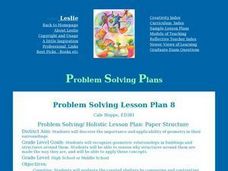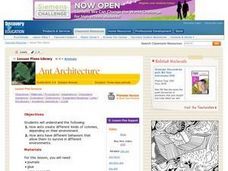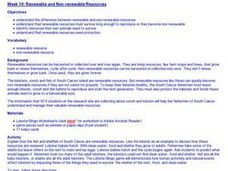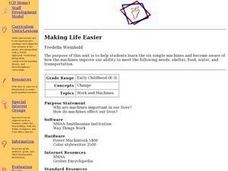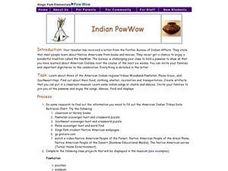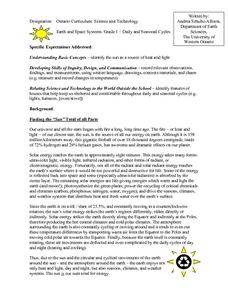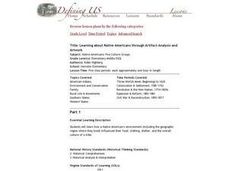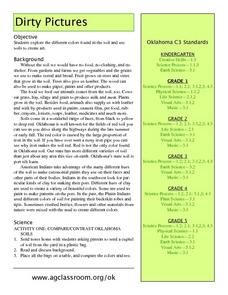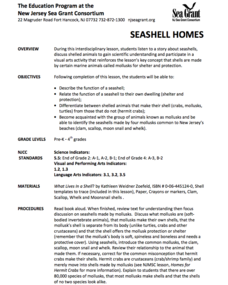Curated OER
Winer Survival
Students study how animals need water, food, shelter, and space to survive. They also study what animals need to survive in the winter. They play the part of animals and winter "threats" in a game of tag to reinforce concepts.
Curated OER
Primary History: Children of World War 2- Air Raids
In this history worksheet, students make a model of an Anderson air raid shelter from World War 2. Students write a diary entry about one night in an air raid shelter. There is no historical information on this page and research will be...
Curated OER
Problem Solving/ Holistic Lesson Plan: Paper Structure
Students observe geometric relationships in buildings and structures. They reason why structures are constructed in a specific way by applying geometric concepts. They construct a shelter using their geometric knowledge.
Curated OER
Ant Arcitecture
Students create pages of a classroom book on the different structures that ants build. They view and discuss a video on ants then, in small groups, research a type of ant shelter. They relate the shelter to the environment in which the...
Curated OER
The Effects of Limited Space on a Culture
Students predict the impact of population density on shelter, transportation, recreation, land use, and social skills and then research that impact on Japan. They write a response about the impact of population density on food...
Curated OER
Prehistoric Indians
Fourth graders identify the four Native American groups of Wisconsin. They compare the four groups through discussion and list the four groups with their tools, food, shelter, and time period.
Curated OER
Native Americans in Utah History: Research Project
Students research the basic cultural information available on the various Native American cultures of Utah. They investigate the historical time period, shelters, weapons, tools, foods and methods of obtaining food.
Curated OER
Renewable and Non-renewable Resources
Students play Lobster Bingo on a provided worksheet. This game demonstrates how human activities and natral events affect lobsters by impacting their food, clean water, and shelter of the reef.
Curated OER
Making Life Easier
Students use a chart of the six simple machines and become aware of how the machines improve our ability to meet the following needs: shelter, food, water, and transportation. Students use model cars to experiment with force. They divide...
Curated OER
E. coli and Their Human Environment
Students are able to observe how environmental changes (antibiotics) affect the growth of E. coli. They are able to use the "F" test for statistical analysis. Students can explain that E. coli is a common rod-shaped intestinal...
Curated OER
Indian PowWow
Students identify three different American Indian regions and tribes, their food, clothing, shelter, recreation, and transportation. Students create artifacts that can be placed in a museum. Students sing songs, chants, and dance. ...
Curated OER
Daily and Seasonal Cycles
First graders identify the sun as a source of heat and light. They identify features of houses that help keep use sheltered and comfortable throughout daily and seasonal cycles. Students are told that summer is the best season to...
Curated OER
"HOW I USE PLANTS" COLLAGE
Students create a collage that depicts the different ways they, as individuals, use plants. They describe ways in which humans use plants for food, shelter, and clothing and ways in which humans can protect natural areas to maintain...
Curated OER
Wattle and Daub Using Natural Resources to Survive
Seventh graders create list of materials that family of four would need to live and survive in the forest, identify four natural resources used by Cherokee Indians to build shelter, create poster that depicts Cherokee hamlet in summer or...
Curated OER
Five Utah Indian Tribes
Fourth graders trace the emergence and development of culture in Utah. They study the five Utah Indian Tribes and review several names of physical features of Utah that are derived from Indian words. They discuss how many cultures have...
Curated OER
Landscaping for Wildlife
Students identify the essential elements needed for promoting wildlife habitat. They describe the terms used in habitat design and the shelter for wildlife. Students explore how to create a pond to support wildlife and how to create a...
Curated OER
Learning about Native Americans through Artifact Analysis and Artwork
Sixth graders assess how a Native American's environment and the geographic region where they lived influenced their food, clothing, shelter and the overall culture of a tribe. They study the impact of conservation, family, rural life,...
Curated OER
Dirty Pictures
Students investigate how food, clothing and shelter come from soil after they examine soil from their own backyards. They map soils on the color wheel before making glue and soil pictures and tie-dying T-shirts in red soil.
Outdoor Learning Center
Outdoor Survival
Which of the following can you survive without for the longest time: water, food, or a positive mental attitude? The answer may surprise you. Guide learners of all ages through games, activities, and discussions about surviving in the...
National Wildlife Federation
Massive Migrations: Grades 5-8
Many Arctic species only spent a fraction of their lives in the Arctic region. Scholars research migrating Arctic species to learn more about their habits. They focus on their migration habits including distances, time, and challenges...
Channel Islands Film
Lone Woman of San Nicolas Island: Lesson Plan 4
Imagine being stranded all alone on an island for 18 years. How would you survive? Class members are challenged to makes necessities out of natural materials that would likely be found on an island.
Curated OER
Seashell Homes
Pupils listen to a story about seashells. They discuss shelled animals. Learners describe the function of seashell. Pupils relate the function of a seashell to their own dwelling. They differentiate between shelled animals that make...
Curated OER
Graphing the Annual Food Drive
Students graph the number of items contributed to the food drive. They compare daily results to other days or to an overall goal and answer questions based on the graph.
Curated OER
Hunger at Home
Students discuss the plight of the homeless in the U.S. and in their own community. They participate in a food drive for a local shelter. They role play being homeless and discover what it would be like to not have food or shelter.
Other popular searches
- Homes and Shelters
- Native American Shelters
- Shelters for Animals
- Bomb Shelters
- Building Shelters
- Homes Shelters
- School Shelters
- Anderson Shelters
- D.t Shelters
- Design Technology: Shelters
- Fallout Shelters
- Cats+ Shelters




